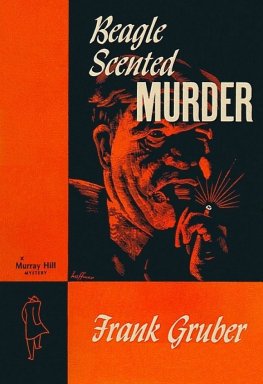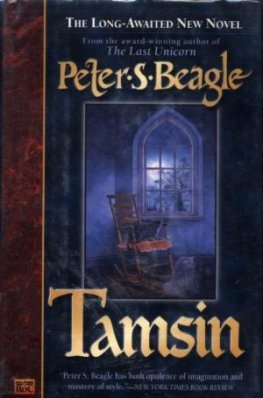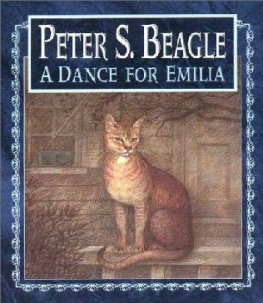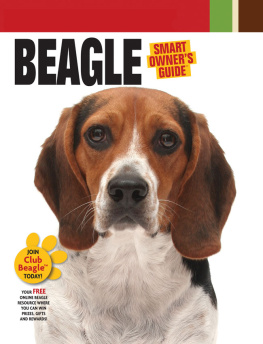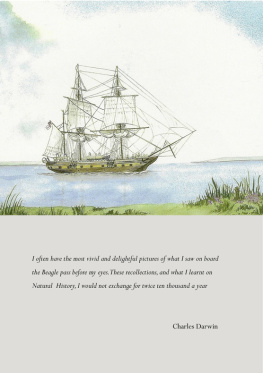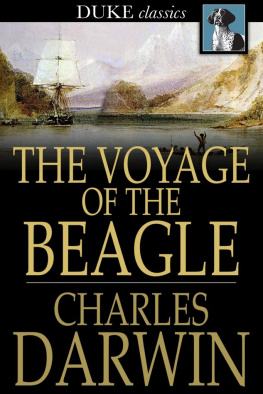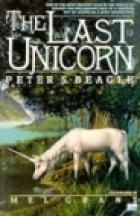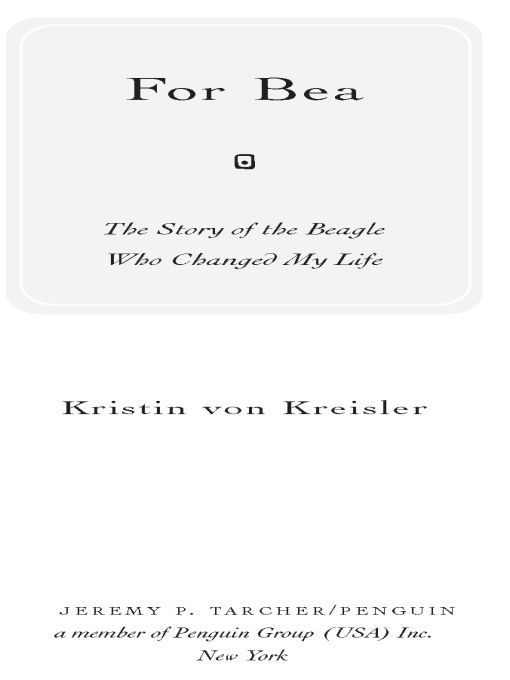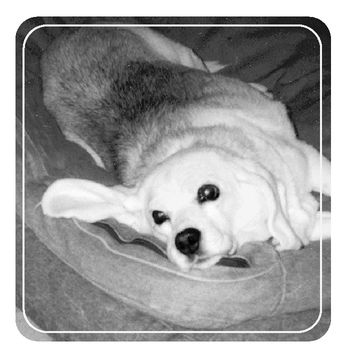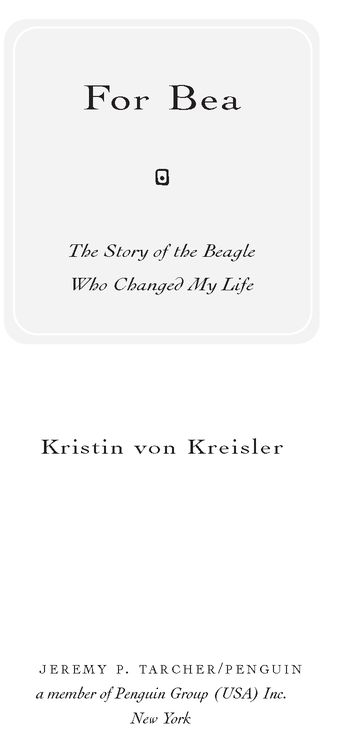Table of Contents
ALSO BY KRISTIN VON KREISLER:
The Compassion of Animals
Beauty in the Beasts
This book, of course, is for Bea.
But its also for another greatly cherished friend:
Ray Kilduff.
WITH LOVE AND THANKS.
Our task must be to free ourselves by widening our circle of compassion to embrace all living creatures and the whole of nature in its beauty.
ALBERT EINSTEIN
Not to hurt our humble brethren is our first duty to them, but to stop there is not enough. We have a higher missionto be of service to them whenever they require it.
ST. FRANCIS OF ASSISI
Foreword
UNTIL I READ THIS heartwarming book, I was not confident that a dog who had lived her entire life in a research laboratory could ever reenter the world she was meant to live ina world of trust, fidelity, and above all, love. But thats just what Kristin von Kreislers adorable beagle did. Kristins experiences convinced me that, yet again, in certain areas, dogs and perhaps other animals are our emotional superiorsthat is, they feel certain emotions more deeply, more intensely, and more purely than do many of us.
Beas chronicle was no one-way street where woman rescues dog and dog shows gratitude. Quite the contrary: Bea also rescued Kristin. Through their interaction, both dog and human were able to emerge from their respective shells, proving that love is answered by love. There is no greater power. And when we are willing, as Kristin was, to allow that love to spread beyond our own immediate species, the rewards are extraordinary.
Reading Kristins account of Beas life is like listening to a beloved aunt tell you a story you will remember for the rest of your life. If you liked beagles before, you will love them now. I urge you to clear your evening of other plans, sit down, as I did, with this precious book, and stay until you have finished. Be forewarned: Tears and laughter are highly likely!
Jeffrey Moussaieff Masson
author of When Elephants Weep
and The Nine Emotional Lives of Cats
Introduction
YOU KNOW HOW SOMETIMES your life can seem to turn into a jungle of complexities? You worry that just one slight lurch of your wheel of fortune and everything could fall apart? That was how my husband John and I were feeling. After fifteen happy, stable years of marriage, we were living in upheaval. The truth is, we were scared.
I had just quit my tenured college-teaching job to become a freelance writer. Though I had published a few magazine articles, I was obsessing over the possibility that I might not sell more. Most days, all day long, anxiety nibbled tiny pieces from my stomach. Most nights I lay there, blinking in the dark.
John wasnt doing very well either. A chemical engineer, hed just left a secure job in a research lab to join a large Silicon Valley consulting organization, where he had only a few months to prove his worth or hed be out. He worried constantly about the risk he was taking. While I was blinking in the dark at night, he was tossing in bed and grinding his teeth.
Also, to make it easier for him to commute, we had to move. Just talking about moving, without even reaching for the phone to call a realtor, made us feel lonely and uprooted. For all our married lives, wed lived in Mill Valley, California, a small town near San Francisco, at the base of a mountain with forests and winding roads and charm. We were about to lose all that, to say nothing of our beloved neighbors, who brought us casseroles when we were sick and who loyally guarded our house when we were on vacation.
Our house was our nest, where we had intended to live forever. Now, because of a vague midlife restlessness, everything was changing. We were changing. The question of whether wed succeed or fail hung in the air above the shark fin of insecurity that circled us and added to our stress.
Of course, our anxieties spread to our animals. At night our German shepherd, Ludwig, barked at branches scraping the rain gutters in the wind or at mice sneaking around in the periwinkle, sounds that in the past hed have ignored. Tigger, our usually voracious tabby kitty, picked at her food like a fussy restaurant critic and left piles of uneaten ocean whitefish in her bowl. Whenever John and I sat at the table after dinner and discussed healthcare plans or carpools, Ludwig and Tigger hid in the bedroom to escape the tension, which emanated from us in curly waves. Agitation had become our frequent dinner guest, and the animals knew it.

ONE OCTOBER NIGHT, to escape the stress, John and I took Ludwig for a walk. In contrast to our worry, the evening was serene and beautiful. After months of fog curling over the mountain, an Indian summer had turned the air balmy and drawn out the rich scent of bay trees. Crickets chirped, and dogs barks echoed through the valley as we walked along under a silver moon.
Ludwig, his nostrils flaring with little snorts and puffs, sniffed each message left by other animals along the road. As he bent down to decode a message in a crack in the asphalt, his collar clinked against his leash. Ahead of us, off to the right of the road, a rustling sound came from a clump of brush. It could have been a raccoon, possum, porcupine, deereven a rattlesnake. Whatever it was, Ludwig wanted a bite out of it. He reared up on his hind legs, lunged at it with all his German-shepherd strengthand nearly yanked John facedown on the pavement.
John yanked back. He shouted, SIT!
Suddenly a body shot out of the foliage and dashed across the road into more brush. Ears and a tail flew in the air. Paws flew over the pavement.
In the moonlight, if I squinted, I could make out the body of a dogblack and tan and white. Subtract the white and you might have army camouflage. The dog ran out of the brush and zigzagged from one side of the road to the other; she didnt seem to know in what direction to run. But she was desperate to escape usespecially Ludwig, who rattled his leash and whimpered as he tried to control his urge to chase.
The little dog, clearly aware that she was just the length of a leash from battery, tore down the road away from us, ran up a driveway, then raced back down. Obviously confused, she leapt into a patch of nasturtiums, found they were too low to the ground to provide enough cover, and scrambled down into a dark gully.
That dog is lost, I said.
Im sure shes not, John replied. Shes just out enjoying the night the same as we are.
Youre just making excuses because you dont want me to bring her home, I said.
We dont always have to be the Humane Society.
We wouldnt be the Humane Society. We just have to find out where the dog belongs.
Let somebody else take care of her. We dont have time. John sounded put-upon and tired.
He could have argued endlessly, of course. But although John surely must have wished at times that I were different, hed learned to live with my undeniable drawback: I was a pushover, a quivering violet, a sucker for needy animals. I could not bear to see them lost or suffering or scared.


